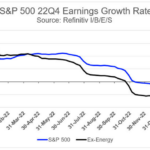Global Financial Crisis 2.0?
How the Coming Economic Bloodbath (and Eventual Opportunity) Is Eerily Similar to the 2008 Subprime Meltdown
Chapter 1: The Credit Collapse we’re about to see has been building to a head for a while now. Silicon Valley Bank was simply the first domino to fall
Unless you’ve been living under a rock…in space…with earplugs in…you know that Silicon Valley Bank (SVB) went kaput early in March 2023.
But how exactly? What the heck actually happened?
It’s surprisingly simple. So simple you would have expected them to see it coming.
It all started when SVB used customer deposits to buy more than $119B of securities during 2020 and 2021.
That in itself wasn’t the problem. It’s a very common practice for banks to use customer deposits to generate returns. That’s basically their business model.
The problem was their balance of assets and liabilities.
See, if you’re a bank, customer deposits are one of your big liabilities. They cost you money, after all. You have to pay depositors interest; hence, liability.
So how do you offset that liability?
You use those customer deposits to invest in assets that pay YOU a higher interest rate than what you have to pay depositors. This won’t be the first or last time you hear me use the word arbitrage.
Arbitrage is exactly what SVB thought they were doing when they bought all those securities back in 2020 and 2021.
The whole issue arose because SVB didn’t hedge those securities (assets)
This created an asset/liability mismatch, where SVB's deposits had what’s called “floating interest rate exposure,” but its assets did not.
A floating rate is the opposite of a fixed rate; it goes up or down in accordance with changes in the Fed Funds rate. A deposit account (like a savings account, money market or CD) generally has a floating rate.
Ideally, a bank’s balance sheet should contain assets and liabilities with the right mix of floating rates and fixed rates, such that they counterbalance each other. That’s in essence what it means to be hedged.
This is where SVB screwed the pooch
The securities they bought back in 2020 and 2021 did NOT have floating rate exposure. Instead, those securities pay very low fixed rates that have not increased with Fed rate hikes (in contrast to the floating rates on the deposit accounts).
Essentially, as interest rates rose, the value of the Bank's assets fell and their liabilities increased, and they incurred an “unrealized” negative net equity position.
In order to make higher and higher interest payments to depositors and to accommodate customer withdrawals, SVB needed cash. It had to sell a struggling $21 billion security portfolio at a discount, and lost $1.8 billion on the sale. That sale made its negative equity position “realized.”
On March 8, SVB told investors it planned to sell $2.25 billion in new equity shares to plug the hole in its finances
Which understandably spooked account holders and investors, and led to a massive run on the bank.
In response, regulators shut down SVB on Friday, March 10.

As little as 7% of SVB's deposits were insured by the Federal Deposit Insurance Corporation ("FDIC"), and all uninsured accounts were left in the lurch.
So what were the securities that caused all the trouble?
No, it wasn’t MBSs or CDOs this time (though those securities do have a role in how things played out).
The irony of all ironies?
US Treasury bonds were the undoing of SVB.

Yes, $21B of the theoretically lowest-risk asset known to man is what ultimately poisoned their balance sheet.
And if bonds made SVB insolvent, everyone else is insolvent too… including the Fed
Wells Fargo, for example, recently reported $50 billion in unrealized losses on its bond portfolio.
That’s a HUGE chunk of Wells Fargo’s capital, and it doesn’t even include potential derivative losses (futures, options, swaps, etc).
Bottom line: anyone who has purchased long-term government bonds — be it banks, brokerages, large corporations, state and local governments, foreign institutions — they’re all sitting on enormous losses right now, and are at risk of failure.
In other words, US Treasuries are the new “toxic security.”
Scary stuff. And the story doesn’t end there.
What Should You Do About What You Just Learned? Schedule a Call with Me.
If you’re an accredited investor and you’re dead serious about TRUE Financial Freedom…
…if you believe you can add a zero to your net worth and income over the next 5-7 years but not you're sure if you've got the right wealth strategy…
…and if you're serious about clawing back more time to spend with your family on things that truly give your life meaning…
…then schedule a call with me ASAP.



Leave a Reply
Want to join the discussion?Feel free to contribute!